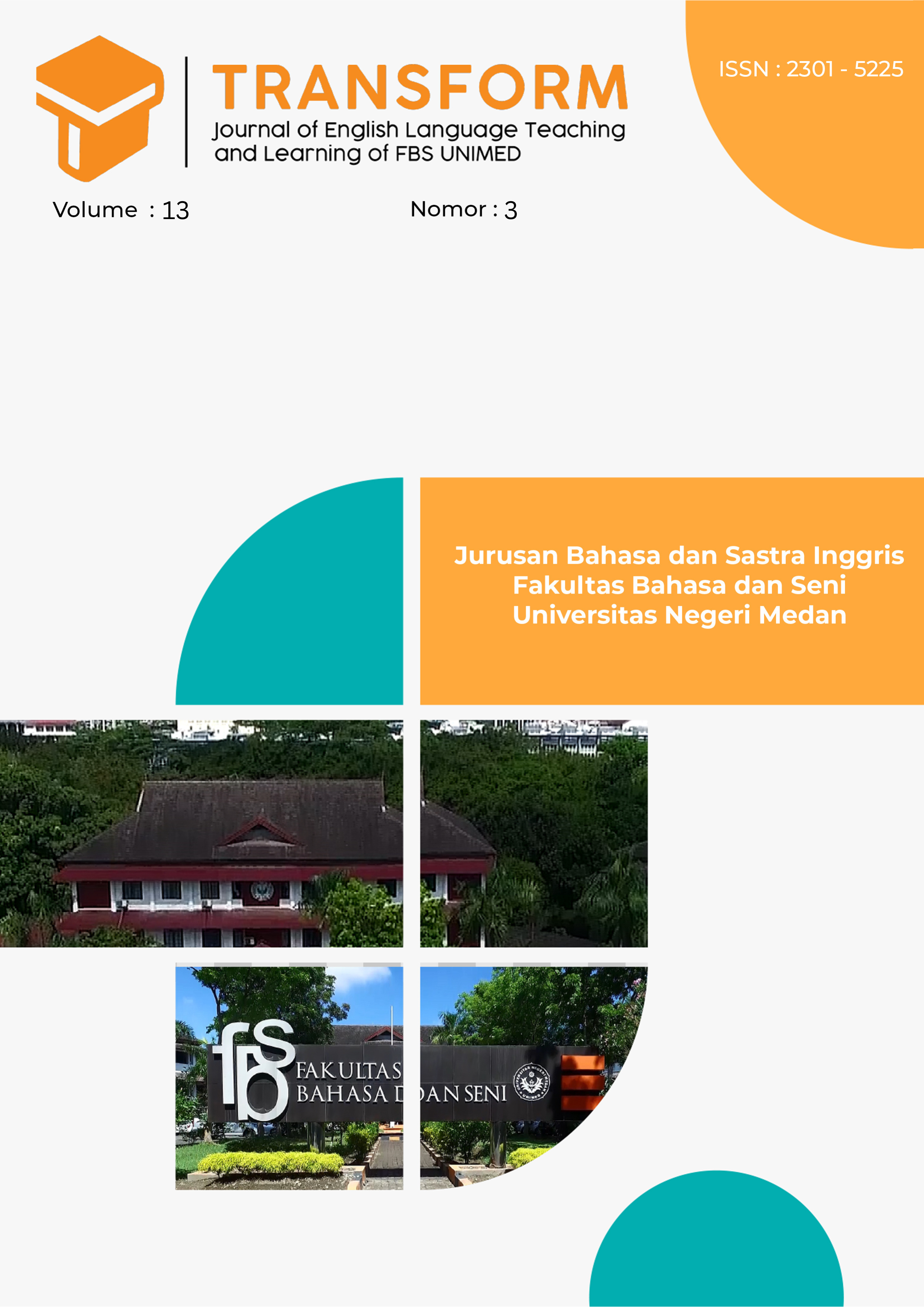Conflict and Personality of The Main Character in Kim Yong-Hoon’s Mask Girl: A Psychological Analysis
DOI:
https://doi.org/10.24114/tj.v13i3.67212Keywords:
Conflict, Korean Drama, Main Character, Mask Girl, PersonalityAbstract
This study explores the conflict and personality of the main character, Kim Mo-mi, in the Korean drama Mask Girl directed by Kim Yong-Hoon. By employing qualitative methodology, the research investigates the internal and external conflicts faced by the main character through 30 pieces of dialogue from the script. Using theories by Kenney (1966) and McCrae & Costa (2005), the study categorizes these conflicts and analyzes Kim Mo-mi's personality traits. The findings reveal significant internal conflicts arising from her self-perception and external conflicts involving her relationships with others. The study concludes that these conflicts significantly influence Kim Mo-mi's personality, highlighting the importance of psychological analysis in literary works.References
Bernardo, K. (2011). Types of Characters in Fiction. Vancouver, Colin Welch Teaching Resources.
Bit, K. G., A. V. Gemilang, A. D. Prastanti. (2022). An Analysis of Zach Sobiech's Personality as the Main Character in Clouds Movie. JELLT: Journal of English Language and Language Teaching, 6(2), 100-109
Komang, A., I. G. N. Winarta, & I. D. A. D. M. Santika. (2022). An Analysis Of Psychological Aspect Of The Main Character In Cruella Movie. ELYSIAN JOURNAL: English Literature, Linguistics and Translation Studies, 2(2), 85-95.
Kenney, W. (1966). How To Analyze Fiction, NY: Monrach Press.
Kozloff, S. (2000). Overhearing film dialogue. Ewing, University of California Press.
Liu, T. (2023). The Interpretation of the Character in the movie “Joker” from the Psychoanalytic Criticism. International Journal of Education and Humanities, 8(2), 206-210.
Maku, S. E., I. G. A. S. R. Jayantini, I. W. Juniartha. (2022). An Analysis Of The Main Character’s Conflict in The Movie Act’s Of Vengeance. LITERA: Jurnal Litera Bahasa Dan Sastra, 8(2).
McCrae, R. R., & P. T. Costa. (2003). Personality in adulthood: A five-factor theory perspective. Guilford Press.
Nurbaya, N. (2021). The Inner Conflict of The Main Character of Bumi Cinta, A Novel Of Habiburrahman El Shirazy: Kurt Lewin's Conflict Approach. In Prosiding Seminar Nasional Dan Internasional Hiski, 161-173.
Rachmawati, P. (2018). The Analysis of Conflicts Reflected By The Main Characters Of Movie Entitled Rise Of The Guardians. Jurnal Ilmiah Bahasa Dan Sastra, 5(2), 66-76.
Ratna, Nyoman Kutha. 2011. Antropologi Sastra: Peranan Unsur-Unsur Kebudayaan dalam Proses Kreatif. Yogyakarta: Pustaka Pelajar.
Rustamov, IT, JS, Mamatkulov, AA. Boy Matov. (2021). Place Small Genre Text In The Genre Feature. History of the Romanian Society for Cell Biology, 5325-5331.
Sahida, S. S. (2016). Diplomasi Kebudayaan Korea Pengaruhnya Terhadap Apresiasi Kaum Muda di Indonesia Atas Film Dan Drama Korea (Doctoral Dissertation, PERPUSTAKAAN).
Sami, A. S. A. (2023). A Psychological Approach to Internal Conflict in JK Rowling’s Harry Potter Series. Academic Journal of Nawroz University, 12(3), 518-532.
Yong-Ho, T. (2019). The Korean Wave as a Powerful Agent: Hidden Stories from a North Korean Defector. In South Korean Popular Culture and North Korea (Pp. 54-66). Routledge.
Zunshine, L. (2006). Why we read fiction: Theory of mind and the novel. Ohio State University Press
Downloads
Published
How to Cite
Issue
Section
License
Copyright (c) 2025 Sofia Ananda Ginting

This work is licensed under a Creative Commons Attribution-ShareAlike 4.0 International License.
Authors who publish with this journal agree with the following terms:
- Authors retain copyright and grant the journal right of first publication with the work simultaneously licensed under a Creative Commons Attribution License that allows others to share the work with an acknowledgment of the work's authorship and initial publication in this journal.
- Authors are able to enter into separate, additional contractual arrangements for the non-exclusive distribution of the journal's published version of the work (e.g., post it to an institutional repository or publish it in a book), with an acknowledgment of its initial publication in this journal.
- Authors are permitted and encouraged to post their work online (e.g., in institutional repositories or on their website) prior to and during the submission process, as it can lead to productive exchanges, as well as earlier and greater citation of published work (See The Effect of Open Access).
- This work is licensed under a Creative Commons Attribution-ShareAlike 4.0 International License.








